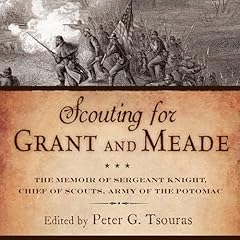
Surgeon in Blue
Jonathan Letterman, the Civil War Doctor Who Pioneered Battlefield Care
Failed to add items
Add to Cart failed.
Add to Wish List failed.
Remove from wishlist failed.
Adding to library failed
Follow podcast failed
Unfollow podcast failed
Buy for $21.00
-
Narrated by:
-
Kyle Munley
-
By:
-
Scott McGaugh
The first full-length biography of the Civil War surgeon who, over the course of the war’s bloodiest battles - from Antietam to Gettysburg - redefined military medicine.
Jonathan Letterman was an outpost medical officer serving in Indian country in the years before the Civil War, responsible for the care of just hundreds of men. But when he was appointed the chief medical officer for the Army of the Potomac, he revolutionized combat medicine over the course of four major battles - Antietam, Fredericksburg, Chancellorsville, and Gettysburg - that produced unprecedented numbers of casualties. He made battlefield survival possible by creating the first organized ambulance corps and a more effective field hospital system. He imposed medical professionalism on a chaotic battlefield. Where before 20 percent of the men were unfit to fight because of disease, squalid conditions, and poor nutrition, he improved health and combat readiness by pioneering hygiene and diet standards. Based on original research, and with stirring accounts of battle and the struggle to invent and supply adequate care during impossible conditions, this new biography recounts Letterman’s life from his small-town Pennsylvania beginnings to his trailblazing wartime years and his subsequent life as a wildcatter and the medical examiner of San Francisco. At last, here is the missing portrait of a key figure of Civil War history and military medicine. His principles of battlefield care continue to be taught to military commanders and first responders.
©2013 Jeffrey Moore (P)2013 Audible, Inc.Listeners also enjoyed...




















Editorial reviews
Listeners will feel like curling up in a comfortable armchair for narrator Kyle Munley's even-toned performance of Civil War surgeon Jonathan Letterman's biography. Letterman revolutionized combat medicine, making battlefield survival possible by creating a more effective field hospital system, improving hygiene standards, and imposing medical professionalism on a chaotic battlefield. Munley depicts battlefield scenes with a gravity that underscores their horrific conditions, and his consistent, measured cadence makes this blend of Letterman's personal history and the examination of Civil War-era medical practices accessible to all.
People who viewed this also viewed...












Would you say that listening to this book was time well-spent? Why or why not?
Interesting listen. Our modern battle-field medicine practices come down for Jonathan Ledermen.How could the performance have been better?
The narration is, sadly, the lower point of this book. It is serviceable, but it is very monotone and lifeless.Great content, ok Narration
Something went wrong. Please try again in a few minutes.
love
Something went wrong. Please try again in a few minutes.
What did you like best about Surgeon in Blue? What did you like least?
The story about Jonathan Letterman and his life was compelling. The way that he was able to influence McClellan and others was never explained.What was one of the most memorable moments of Surgeon in Blue?
Certainly, Letterman's accomplishments in expanding the purview of the medical corps. But, I had an uneasiness that some of the changes were not his innovations, but those of European military physicians.What didn’t you like about Kyle Munley’s performance?
Munley continuously made factual errors that are so blatant that even the casual Civil War enthusiast could pick them out. For example, it's not John Longstreet, but James. It's not A. G. Hill, its A. P. Hill. There weren't 33,000 casualties at Antietam, there were closer to 23,000. And, then there was the mispronunciations. His performance was only memorable in the frequency of these problems.Was Surgeon in Blue worth the listening time?
Probably. Although much of it was extraneous material that only tangentially affected the thesis of the book.Any additional comments?
The author, in attempting to put into context the challenges Letterman faced, wrote about several battles, how they unfolded, etc. This seemed like a way to fill the pages, rather than be a vivid description. Moreover, they were brought with oversimplifications and omitted key facts.PERFORMANCE WOES DETRACT FROM STORYLINE
Something went wrong. Please try again in a few minutes.
Many of the historical notes he mentions regarding the battles, and leaders (even though he clearly warns readers in the preface that the book will NOT be about battles and leaders) I and the average Civil War amateur will already know. And there are more than a few chapters where I found myself asking who the book was about since the author takes liberties to expound on Letterman's associates more than are necessary though in hind sight, with Letterman dying at a relatively young age (just after he misdiagnoses his wife which causes her to die) adds to the irony of Letterman's surgical lore.
Even considering the aforementioned, maybe the book itself would have been a decent read instead of the audio version because the narration does nothing to help the story along. It was...Horrible!
Try it for yourself and call me a liar if you like it. You might. There is some decent dialog, but if you're looking for a solid biography on strictly Civil War doctor stuff, this title isn't the answer. Then again, you find interest in the hospital administration (I wasn't) which there is plenty of.
Maybe it reads better than the audio version.
Something went wrong. Please try again in a few minutes.
Read by a robot?
Something went wrong. Please try again in a few minutes.


